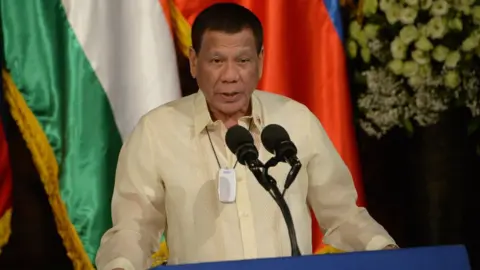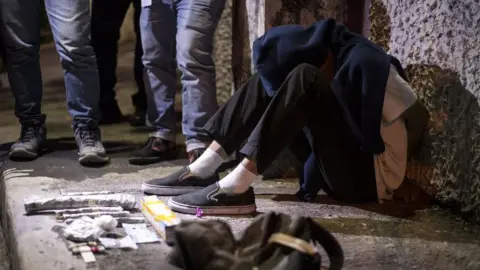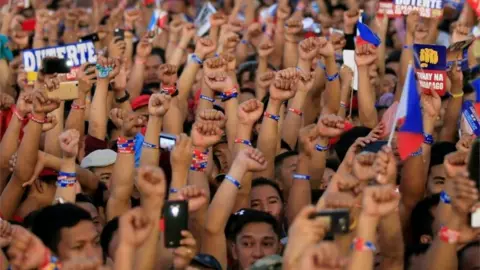Philippines drugs war: UN report criticises 'permission to kill'
 Getty Images
Getty ImagesThousands of people have been killed amid "near impunity" for offenders in the war the Philippines has waged on illegal drugs since 2016, the UN says.
Its report levelled heavy criticism at President Rodrigo Duterte's government.
His drugs crackdown has been marked by high-level rhetoric that can be seen as "permission to kill", the report said, urging an independent investigation.
The administration has in the past rejected all criticism of its policies and denies the killings are illegal.
Official figures show more than 8,000 people were killed in the war on drugs since Mr Duterte took office in 2016. Other estimates put the figure three times as high.
The report found that most victims are young poor urban males and that police, who do not need search or arrest warrants to conduct house raids, systematically force suspects to make self-incriminating statements or risk facing lethal force.
What does the report say?
The 26-page report, prepared by Michelle Bachelet, the United Nation's High Commissioner for Human Rights, examined nearly 900 written submissions from human rights defenders, journalists, trade unionists and the Duterte administration.
 Getty Images
Getty ImagesIn one section, the report said the police's key policy note contained "ominous" and "ill-defined language" such as "neutralising" suspects, and that coupled with "rhetoric at high levels calling for the killings of drug offenders", it was taken as a permission by the police to kill.
"In the context of the campaign against illegal drugs, there has been near impunity for such violations."
According to the UN, statements from the highest levels of government had "risen to the level of incitement to violence" and "vilification of dissent is being increasingly institutionalised."
The report suggests that "the human rights situation in the Philippines is marked by an overarching focus on public order and national security, including countering terrorism and illegal drugs" and that this was "often at the expense of human rights, due process rights, the rule of law and accountability".
What does the Duterte administration say?
It is not the first time his government has been criticised for its brutality in cracking down on drugs and crime.
But so far the Duterte administration has always rejected allegations of wrongdoing and when the UN voted to launch its investigation, Manila branded the probe as a "travesty". According to the UN report, there has been only one conviction for murder despite thousands having been killed.
Rodrigo Duterte won the presidency on a platform of crushing crime and fixing the country's drugs crisis. Despite the many killings he remains very popular in the country.
 Reuters
ReutersBut for the UN report's co-author Ravina Shamdasani, positive opinion polls should not be used to justify bloody campaigns like the drug war.
"The government has a duty under its constitution and under human rights law to protect people from human rights violations," Ms Shamdasani said. "Just because it is popular does not make it right."

'Many love Duterte's strongman style'
Howard Johnson, BBC Philippines correspondent
This hard-hitting report is likely to irk Rodrigo Duterte, but not necessarily change his approach to human rights. After all this is the man who in 2018 told a UN special rapporteur to "go to hell" for allegedly "interfering" in his country's affairs.
Just this week, with a big majority in Congress, the president secured the passage of a controversial "Anti-Terrorism Act", cited in the report as potentially risking the erosion of citizens' constitutional and legal protections.
The government has always insisted Mr Duterte's actions reflect the will of the people who elected him.
Manila's liberal elite continue to revile the president's violent rhetoric, but I've also met many people here who love his strongman style.
In January an opinion poll by Social Weather Stations delivered Mr Duterte a net satisfaction rating of 72%.

What has happened in the drug war?
President Rodrigo Duterte launched his anti-narcotics campaign after taking office in 2016 to deal with a rampant drug problem.
"On the basis of information reviewed, the drug campaign-related killings appear to have a widespread and systematic character. The most conservative figure, based on government data, suggests that since July 2016, 8,663 people have been killed - with other estimates of up to triple that number," the UN report said.
The OHCHR said it ultimately could not verify the number of extrajudicial killings without further investigation.
In December 2018, the country's Commission on Human Rights (CHR) estimated the number of drug-war killings could be as high as 27,000.
Officially, the police say they kill only in self-defence - for example, during drug-bust operations.
What next?
Following the report, the UN's High Commissioner for Human Rights is calling for an independent and effective domestic investigation into the allegations.
She also said that, should there be no credible response within the Philippines, her office would support other methods including "international accountability measures".
The UN human rights office is not the only body investigating the alleged human rights violations in the country. A separate probe is currently under way by the International Criminal Court, also looking into accusations of crimes committed during the war on illegal drugs.
In the absence of thorough investigations into the killings, impunity continues for the perpetrators, the report said.
